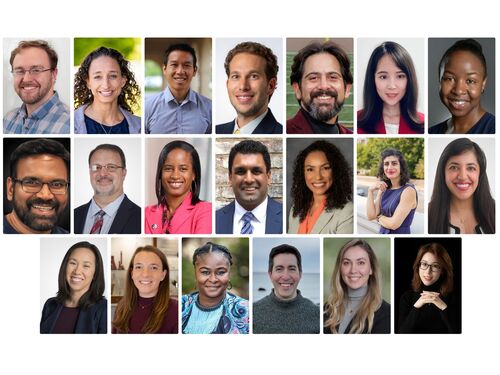Gulf Research Program Provides Nearly $6M for Eight Interdisciplinary Design Studios to Investigate Complex Challenges in the Gulf of Mexico Region
News Release
By Pete Nelson
Last update October 21, 2024
WASHINGTON — The Gulf Research Program of the National Academies of Sciences, Engineering, and Medicine announced today $5.9 million in awards to support the development of eight Gulf Futures interdisciplinary design studios at institutions with accredited architecture programs in U.S. Gulf states. These studios support undergraduate and graduate level interdisciplinary design courses intended to prepare students to use design thinking to develop innovative solutions to critical issues in the Gulf of Mexico region.
In addition to architecture students, the design studios seek to engage non-architecture majors to collaborate and build knowledge, providing students with the opportunity to better understand the multifaceted and complex nature of the challenges facing the Gulf region and to work together to identify and propose integrated and innovative solutions. Through its support of these studios, the GRP aims to help prepare the next generation of architects, designers, and professionals in urban development and related areas.
“Preparing the next generation of professionals to work creatively and collaboratively to address complex regional challenges is one of the top priorities of GRP,” said Lauren Alexander Augustine, executive director of the Gulf Research Program. “We’re delighted to extend our support for these bold and collaborative design studios to help us visualize possible futures for the Gulf region.”
Awards were extended to the five institutions that participated in the 2022 pilot phase of the Gulf Futures Design Studio program, as well as three additional institutions based in Texas to ensure representation from all Gulf states in this second phase of the program.
The awarded studios are:
Gulf Adaptation Design Studio
Project Director: Rob Holmes
Institution: Auburn University
Award: $744,920
Summary: Building on two pilot years, Auburn University will expand the interdisciplinary scope of its Gulf Adaptation Design Studio, adding architecture to a roster of collaborating disciplines that includes landscape architecture, biosystems engineering, graphic design, and natural resources management. A three-year program will enable the faculty team to build deeper and richer connections between participating courses and increase the number and significance of interdisciplinary learning experiences for students. The faculty team will also collaboratively identify a community partnership that will be the focus of all three years, allowing for more sustained community engagement and the delivery of increased value to that community and its stakeholders. The studio program will thus provide direct benefits to the coastal community partners and will provide training for the next generation of coastal researchers and practitioners.
GulfSouth Studio
Project Director: Jeff Carney
Institution: University of Florida
Award: $749,309
Summary: The University of Florida aims to develop an interdisciplinary, studio-based program that builds the skills and capabilities needed to tackle the climate crisis along the Florida Gulf Coast, with an emphasis on team-based planning and design thinking, advanced data application, visualization, and communication, and place-based community engagement. The GulfSouth Studio is a platform for design-based education to provide new design approaches, policy strategies, community engagement methods, and technical tools in response to the challenges of a changing climate and the ongoing transformation in the ways that communities are responding to risk and planning for a more resilient future.
Louisiana Ecosystem Design: Building Resilience Through Interdisciplinary Collaboration
Project Co-directors: Traci Birch and Haley Blakeman
Institution: Louisiana State University
Award: $695,958
Proposal Summary: Building on two years of design studio pilot funding, this program will maintain and expand cross-disciplinary collaborations between designers and scientists to support community-based design education and solutions to address climate impacts regionally. The design studio will bolster interdisciplinary and co-design frameworks and methodologies to increase collaborative efforts among academia, federal, state, and local governments, and communities to address issues of risk and resilience. In support of this, the design studio will develop and maintain strong community partnerships that provide capacity and support to communities struggling to adapt to climate change. This program strives to create active learning spaces that support students, communities, and faculty in innovative collaboration, education, and problem-solving while providing long-term support to make this approach to co-production and design education an accessible research and teaching focus for tenure-track and tenured faculty.
Mississippi Gulf Coast Collaborative Studio
Project Director: David Perkes
Institution: Mississippi State University
Award: $749,270
Summary: This design studio will incorporate interdisciplinary architecture and landscape architecture studios with a research seminar and community engagement, creating a unique approach to studying the Mississippi Gulf Coast. These courses will bring together diverse students with communities and are led by professors with expertise in multiple disciplinary areas that provide specific insight into coastal conditions. The courses will explore myriad challenging issues, such as housing conditions since Hurricane Katrina, historical and cultural preservation of areas affected by disasters, and other topics like environmental protection, community health, economic development, and green energy. Utilizing student research and design projects, the team will develop a design toolkit that includes a set of design patterns and principles to address complex problems that coastal communities can use.
Gulf Coast Climate Futures: Explorations in Regionally Regenerative Design
Project Director: Liz Camuti
Institution: Tulane University
Award: $749,961
Summary: The Gulf Coast Climate Futures studio seeks to engage the tensions between climate mitigation and climate adaptation efforts across the Gulf Coast, a region widely recognized as the domestic backbone of the oil and gas industry. The proposed design studio course and affiliated seminar will engage student researchers in the practice of analyzing, hypothesizing, and proposing alternative scenarios for improving community resilience. By examining existing systems that shape dominant paradigms related to economic growth, ecological stewardship, and industrial-scale energy production, students will develop an understanding of the most complex design challenges facing the region. Building on existing state restoration and resilience plans and regional-scale analyses completed in this program’s initial pilot years, these interdisciplinary courses ultimately intend to put forward innovative design projects for communities that transcend conventional approaches to climate adaptation.
Gulf Adaptive Urban Systems Studio: Shaping the Gulf Coast of Tomorrow
Project Director: Dalia Munenzon Titelboim
Institution: University of Houston
Award: $748,837
Summary: The Gulf Adaptive Urban Systems Studio at the University of Houston delves into the Lower Galveston Bay Watershed’s environmental intricacies in the context of the region’s historical development patterns. The proposed studio will operate across various scales — from expansive watershed planning to detailed architectural proposals. With a forward-thinking focus on long-term scenario planning, students will proactively engage with evolving climate, infrastructural dynamics, and socioeconomic factors that define the urban fabric. Complementary research seminars develop analytical skills and resources. The proposed Adaptive Urban Systems research lab and Climate Adaptation Club will translate research into actionable strategies and foster community dialogue on pressing local issues.
IDEA Climate Justice Research and Community-Based Collaborative Design Studio
Project Director: Jessica April Ward
Institution: Prairie View A&M University
Award: $749,108
Summary: The Integrated Design for Environmental and Climate Justice Research and Community-Based Collaborative Design Studio will strengthen resilience in previously segregated and historically significant communities in Houston and the wider Gulf Coast region. This studio will use qualitative and quantitative stakeholder need assessments, mapping, and visualization methods to capture stakeholder experiences during and after extreme weather events, power grid failure, flooding, and associated with poor air and water quality. Students will participate in a hands-on service-learning model while conducting research and design of renewable energy, disaster housing, and climate justice policy. Leveraging 10 years of partnerships throughout the city of Houston working with residents, community organizers, city personnel, and local leaders in combination with the Gulf Futures network, the studio will empower students to become leaders and entrepreneurs in their field through a cross-disciplinary approach.
The Gulf Coast Megaregion
Project Director: Albert Pope
Institution: Rice University
Award: $714,630
Summary: The Gulf Coast Megaregion studio will track the Gulf of Mexico region’s energy and economic transition through one of its most sensitive social and environmental sites: the Houston Ship Channel. The ship channel, which includes an inland port, has been in existence since 1914 and has served as the region’s economic engine, uniting the oil and gas industry’s upstream and downstream services into a global petrochemical complex. The proposed studio will anticipate the region’s transition out of fossil fuel dependence through an examination of the natural and urban resources in three key communities that line the ship channel. Students will engage stakeholders in these neighborhoods and document both their challenges and their potential solutions. Using their base of information, the students will anticipate a progressive future for these neighborhoods and for the region through a series of concrete design proposals.
The National Academies’ Gulf Research Program is an independent, science-based program founded in 2013 as part of legal settlements with the companies involved in the 2010 Deepwater Horizon disaster. It seeks to enhance offshore energy system safety and protect human health and the environment by catalyzing advances in science, practice, and capacity to generate long-term benefits for the Gulf of Mexico region and the nation. The program has $500 million for use over 30 years to fund grants, fellowships, and other activities in the areas of research and development, education and training, and monitoring and synthesis.
The National Academies of Sciences, Engineering, and Medicine are private, nonprofit institutions that provide independent, objective analysis and advice to the nation to solve complex problems and inform public policy decisions related to science, engineering, and medicine. They operate under an 1863 congressional charter to the National Academy of Sciences, signed by President Lincoln.
Contact:
Pete Nelson, Director of Public Engagement and Communications
Gulf Research Program
Email: pnelson@nas.edu
More like this
Discover
Events
Right Now & Next Up
Stay in the loop with can’t-miss sessions, live events, and activities happening over the next two days.
NAS Building Guided Tours Available!
Participate in a one-hour guided tour of the historic National Academy of Sciences building, highlighting its distinctive architecture, renowned artwork, and the intersection of art, science, and culture.



